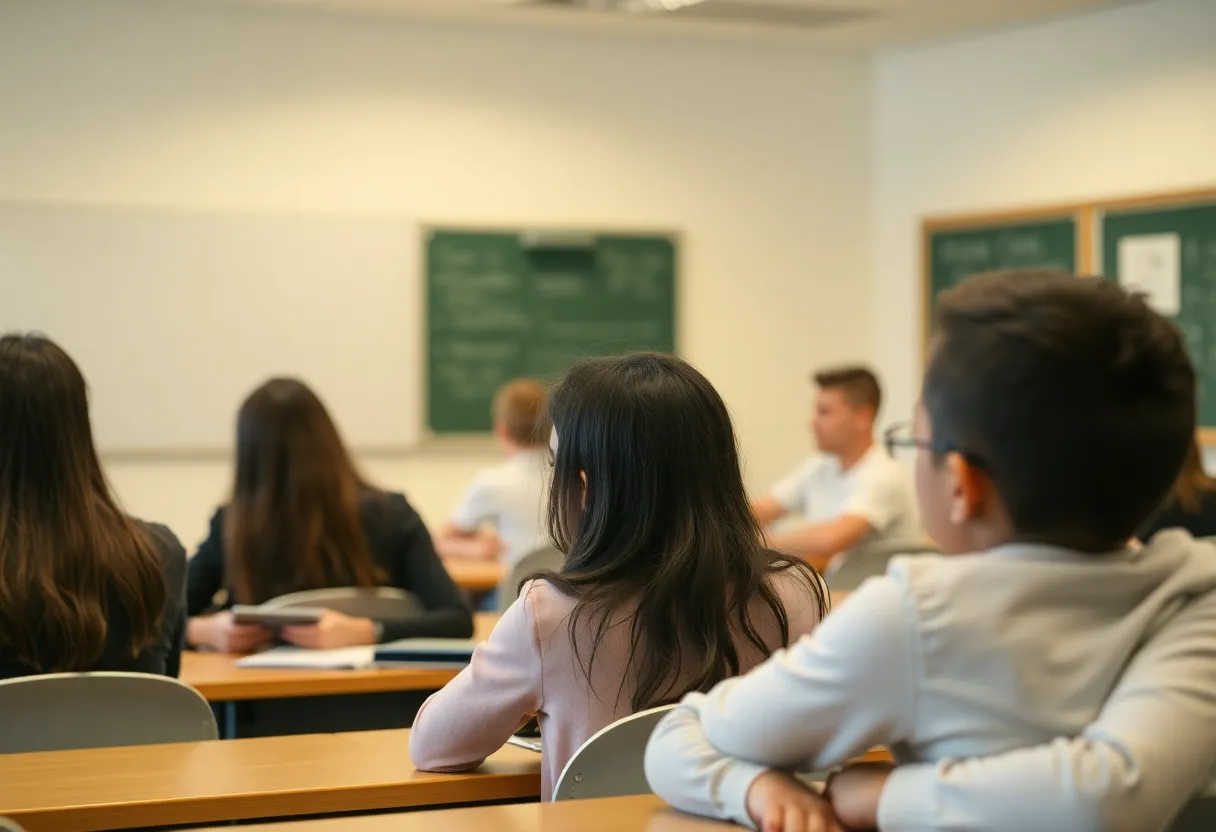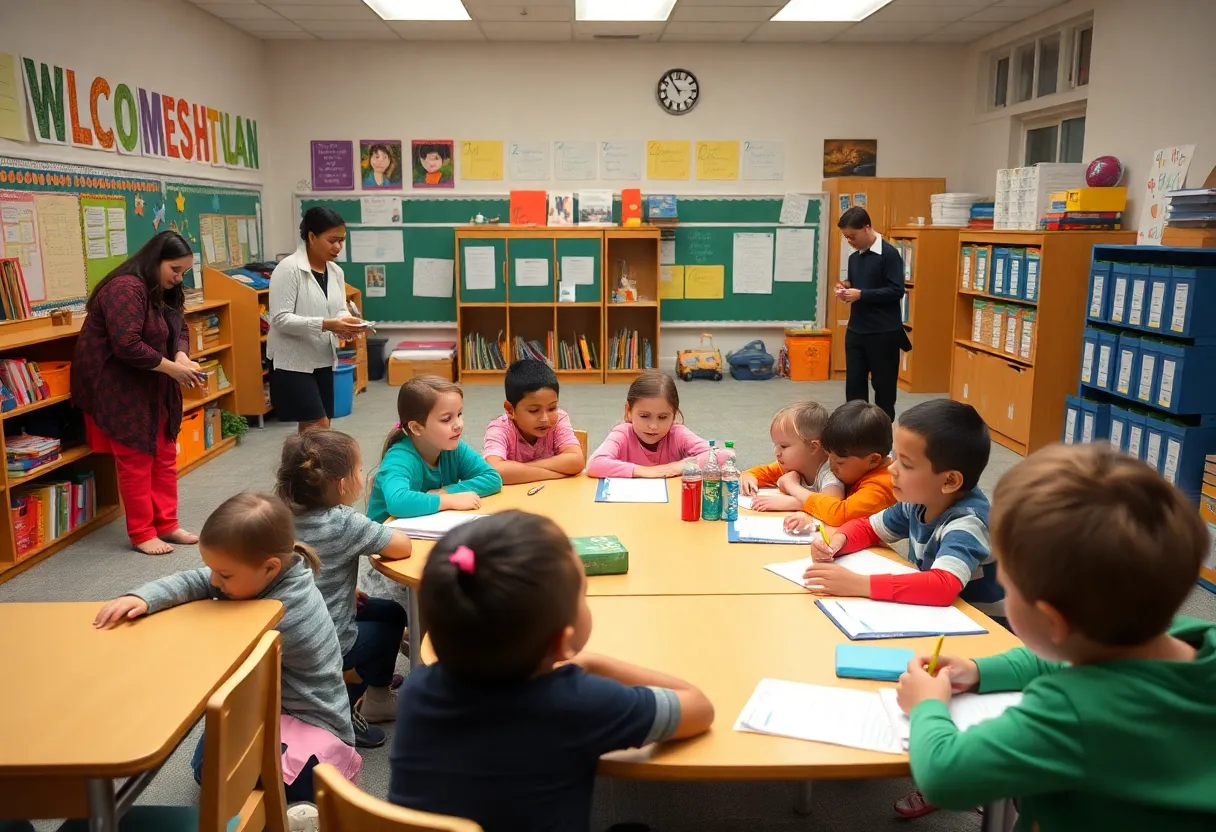News Summary
The Los Angeles Unified School District has implemented a full-day ban on cellphones and personal electronic devices in schools starting February 18. The policy aims to minimize distractions during the school day, including classrooms, lunch, and passing periods. While students with disabilities have exemptions to retain their devices for specific needs, concerns exist regarding the overall impact on student engagement and social connections. Initial feedback reflects increased classroom focus, yet debates continue on balancing restrictions with the needs of all students.
Los Angeles Implements Full-Day Cellphone Ban in Schools, with Exceptions for Students with Disabilities
Los Angeles, CA — Starting February 18, the Los Angeles Unified School District (LAUSD) has enforced a comprehensive ban on student use of cellphones and other personal electronic devices during the entire school day. The policy extends previous restrictions, covering not only classroom instruction but also lunch and passing periods, aiming to reduce distractions and promote a safer, more focused learning environment.
Expanded Restrictions and Reasons Behind the Policy
The LAUSD Board of Education voted in June 2024 to expand its existing cellphone restrictions after considering concerns raised by educators, parents, and mental health advocates. The new policy mandates that students store their devices in magnetically sealed pouches or backpacks during school hours. The district believes that limiting access to phones will help improve classroom engagement, reduce social media-related distractions, and lessen incidents of cyberbullying among students.
School officials cite rising worries about the impact of social media and constant connectivity on youth mental health, emphasizing that devices often interfere with focus and pose risks of bullying. While some initial feedback has been positive, with teachers noting increased attentiveness and participation, critics caution that such bans may overlook essential needs of certain students.
Exemptions for Students with Disabilities
More than 63,000 students with disabilities enrolled in LAUSD are granted special accommodations, including permission to use cellphones. These exemptions are typically outlined in Individualized Education Programs (IEPs) or Section 504 Plans, which are legal documents guaranteeing students access to necessary supports and services. Despite the overall ban, students with approved plans can retain their devices, provided specific conditions are met.
Among these students is Faith, a middle-schooler from North Hollywood who uses a cochlear implant—her cellphone helps her control her hearing device and connect with friends. Families of students with disabilities report that devices assist in managing medical needs, controlling anxiety, and regulating emotions, which are critical for their well-being and academic success.
Operational Challenges and Family Engagement
Families are advised to actively communicate with school officials to ensure that their children’s individual needs are recognized and accommodated. While the law allows for exemptions through IEP or 504 Plan processes, some parents have noted that they must formally assert their rights to secure necessary device access for their children.
However, the policy has sparked concern among some families and advocacy groups. Critics say that the ban may inadvertently hinder students who rely on their phones for assistive technology or emotional support. They worry that implementing blanket restrictions might violate or complicate the rights of students with disabilities to receive a free appropriate public education under the federal Individuals with Disabilities Education Act (IDEA).
Impacts on Students and School Community
In addition to exemption considerations, students without special accommodations face potential disadvantages. Many students use their devices to manage medical conditions, stay connected with family, or use educational apps. Without access, students might feel isolated or miss out on learning opportunities and social interactions.
Despite the restrictions, some students have attempted to bypass the rules, using decoys or accessing hidden tools to use their phones. Concerns persist about the effectiveness of the ban and its enforcement, especially during school hours when devices must be stored in approved pouches or backpacks.
Initial Feedback and Ongoing Debate
LAUSD reports that initial responses from teachers and students have been largely positive, citing increased classroom focus and fewer distractions. Nevertheless, many parents express mixed feelings. Some appreciate the effort to create a distraction-free environment, while others worry about safety and emergency access, highlighting the importance of enabling quick communication in urgent situations.
Broader Context and Future Outlook
Studies on the mental health effects of cellphone restrictions among adolescents show mixed results, with no definitive evidence that bans improve overall social media use or mental well-being. Advocates argue that balanced policies are needed to support students’ educational and emotional needs without imposing overly restrictive measures.
As LAUSD continues to implement and refine its cellphone policies, ongoing discussions focus on how best to support all students—especially those with disabilities—while fostering a safe and engaging learning environment for everyone.
Deeper Dive: News & Info About This Topic
HERE Resources
Bear Creek High School Implements Cell Phone Policy with Positive Results
Additional Resources
- LAist: LAUSD Cell Phone Ban
- Wikipedia: Cell Phone
- Los Angeles Times: LAUSD Cellphone Ban Updates
- Google Search: Cellphone Use in Schools
- NBC Los Angeles: LAUSD Cell Phone Ban
- Google Scholar: Impact of Cellphones on Education
- ABC7: LAUSD Cellphone Ban Details
- Encyclopedia Britannica: Technology in Education
- CBS News: LAUSD Cellphone Ban Overview
- Google News: LAUSD Cellphone Policy
Author: STAFF HERE WASHINGTON DC
The WASHINGTON DC STAFF WRITER represents the experienced team at HEREWashingtonDC.com, your go-to source for actionable local news and information in Washington, DC, and beyond. Specializing in "news you can use," we cover essential topics like product reviews for personal and business needs, local business directories, politics, real estate trends, neighborhood insights, and regional news affecting the area—with deep expertise drawn from years of dedicated reporting and strong community input, including local press releases and business updates. We deliver top reporting on high-value events such as the National Cherry Blossom Festival, Kennedy Center Honors, and the Washington Auto Show. Our coverage extends to key organizations like the Greater Washington Board of Trade and Destination DC, plus leading businesses in government contracting and technology that power the local economy such as Lockheed Martin and Amazon. As part of the broader HERE network, we provide comprehensive, credible insights into the dynamic landscape of the Washington metropolitan area.




